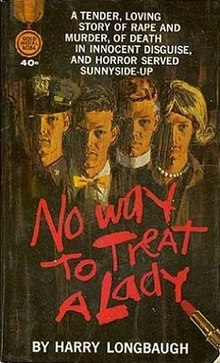 First edition | |
| Author | William Goldman |
|---|---|
| Country | United States |
| Language | English |
| Publisher | Fawcett Publications |
Publication date | 1964 |
| Pages | 182 |
No Way to Treat a Lady is a 1964 novel by William Goldman.
 First edition | |
| Author | William Goldman |
|---|---|
| Country | United States |
| Language | English |
| Publisher | Fawcett Publications |
Publication date | 1964 |
| Pages | 182 |
No Way to Treat a Lady is a 1964 novel by William Goldman.
Goldman wrote the original novel while experiencing writer's block, when writing Boys and Girls Together (published in 1964). He was inspired by an article about the Boston Strangler which suggested there might be two stranglers operating, and Goldman wondered what would happen if that were the case and they got jealous of each other. (In the film adaptation, there is only one strangler; Goldman hated this change. [1] ) He says as he walked to his office, "the book simply jumped into my head. Start to finish. The whole thing... And I remember getting to my office and frantically scribbling down an enormous number of chapters." [2] Goldman was worried about never finishing Boys and Girls Together, so he gave himself two weeks to write the new novel.
He published the novel under a pseudonym, Harry Longbaugh, the real name of the Sundance Kid, but the book was eventually republished under Goldman's real name in 1968. Goldman:
Hiram Hayden, my editor, didn't know what to do with [the novel]. He didn't know, like, or read mysteries. There was a great feeling that Boys and Girls Together was going to establish me as a critical figure, which of course was the reverse of what happened, and Hiram kept saying, "I think you'll damage yourself if you bring this out first. Why don't you try and get it published under a pseudonym?" We went to one or two houses and we went to the paperback original place and they said, "Sure". It came out, and got the best reviews of anything I've ever been connected with. [3]
The novel led to Goldman's being hired by Cliff Robertson to adapt Flowers for Algernon to the feature film Charly (1968), which launched Goldman's screenwriting career. [4]
In 1968 the novel was filmed as a black comedy thriller directed by Jack Smight, with a screenplay by John Gay. [5] The film starred Rod Steiger, Lee Remick, George Segal and Eileen Heckart. Segal was nominated for a BAFTA for his role as Detective Moe Brummel. [6]

William Goldman was an American novelist, playwright, and screenwriter. He first came to prominence in the 1950s as a novelist before turning to screenwriting. Among other accolades, Goldman won two Academy Awards in both writing categories—once for Best Original Screenplay for Butch Cassidy and the Sundance Kid (1969) and once for Best Adapted Screenplay for All the President's Men (1976).
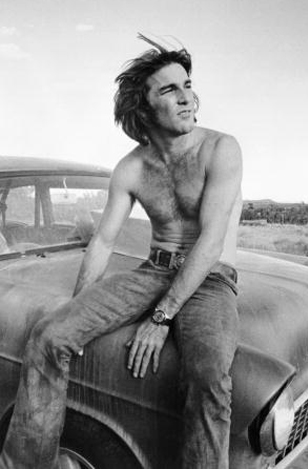
Dennis Carl Wilson was an American musician who co-founded the Beach Boys. He is best remembered as their drummer and as the middle brother of bandmates Brian and Carl Wilson. Dennis was the only true surfer in the Beach Boys, and his personal life exemplified the "California Myth" that the band's early songs often celebrated. He was also known for his association with the Manson Family and for co-starring in the 1971 film Two-Lane Blacktop.
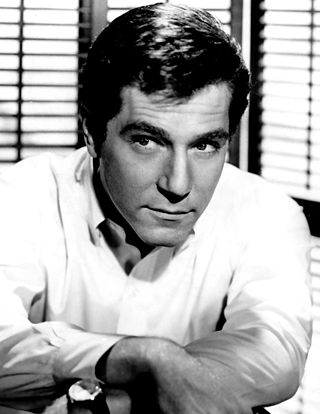
George Segal Jr. was an American actor. He became popular in the 1960s and 1970s for playing both dramatic and comedic roles. After first rising to prominence with roles in acclaimed films such as Ship of Fools (1965) and King Rat (1965), he co-starred in the classic drama Who's Afraid of Virginia Woolf? (1966).

Donald Edwin Westlake was an American writer with more than one hundred novels and non-fiction books to his credit. He specialized in crime fiction, especially comic capers, with an occasional foray into science fiction and other genres. Westlake created two professional criminal characters who each starred in a long-running series: the relentless, hardboiled Parker, and John Dortmunder, who featured in a more humorous series.

Erich Wolf Segal was an American author, screenwriter, educator, and classicist who wrote the bestselling novel Love Story (1970) and its hit film adaptation.

Soldier in the Rain is a 1963 American comedy buddy film directed by Ralph Nelson and starring Jackie Gleason and Steve McQueen. Tuesday Weld portrays Gleason's character's romantic partner.
Elliott Kastner was an American film producer, whose best known credits include Where Eagles Dare (1968), The Long Goodbye (1973), The Missouri Breaks (1976), and Angel Heart (1987).
Marvin H. Albert was an American writer of mystery, crime and adventure novels including ones featuring Pete Sawyer, a French-American private investigator living and working in France.

The Carey Treatment is a 1972 American crime thriller film directed by Blake Edwards and starring James Coburn, Jennifer O'Neill, Dan O'Herlihy and Pat Hingle. The film was based on the 1968 novel A Case of Need credited to Jeffery Hudson, a pseudonym for Michael Crichton. Like Darling Lili and Wild Rovers before this, The Carey Treatment was heavily edited without help from Edwards by the studio into a running time of one hour and 41 minutes; these edits were later satirized in his 1981 black comedy S.O.B..

Pretty Poison is a 1968 American black comedy film directed by Noel Black, starring Anthony Perkins and Tuesday Weld, about an ex-convict and high school cheerleader who commit a series of crimes. The film was based on the novel She Let Him Continue by Stephen Geller. It has become a cult film.

Harper is a 1966 American mystery film based on Ross Macdonald's 1949 novel The Moving Target and adapted for the screen by novelist William Goldman, who admired MacDonald's writings. The film stars Paul Newman as Lew Harper, and was directed by Jack Smight, with a cast that includes Robert Wagner, Julie Harris, Janet Leigh, Shelley Winters, Lauren Bacall, and Arthur Hill.
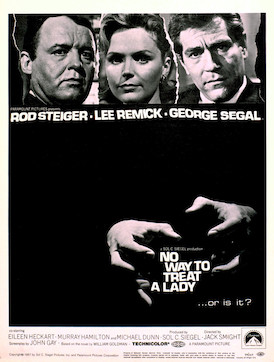
No Way to Treat a Lady is a 1968 American psychological thriller film with elements of black comedy, directed by Jack Smight, and starring Rod Steiger, Lee Remick, George Segal, and Eileen Heckart. Adapted by John Gay from William Goldman's 1964 novel of the same name, it follows a serial killer in New York City who impersonates various characters in order to gain the trust of women before murdering them.
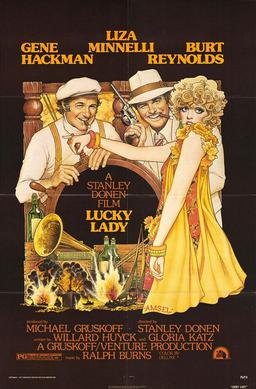
Lucky Lady is a 1975 American comedy-drama film directed by Stanley Donen and starring Liza Minnelli, Gene Hackman, Burt Reynolds and Robby Benson. Its story takes place in 1930 during Prohibition in the United States.
Take a Girl Like You is a 1970 British romantic comedy drama film directed by Jonathan Miller and starring Hayley Mills, Oliver Reed and Noel Harrison. Based on the 1960 novel Take a Girl Like You by Kingsley Amis, it was adapted by George Melly.

The Season: A Candid Look at Broadway is an account of the 1967–1968 season on and off-Broadway by American novelist and screenwriter William Goldman. It originally was published in 1969 and is considered one of the better books ever written on American theater. In The New York Times, Christopher Lehmann-Haupt called the book “Very nearly perfect...It is a loose-limbed, gossipy, insider, savvy, nuts-and-bolts report on the annual search for the winning numbers that is now big-time American commercial theatre.”

Oh, Lady! Lady!! is a musical with music by Jerome Kern, a book by Guy Bolton and P. G. Wodehouse and lyrics by Wodehouse. It was written for the Princess Theatre on Broadway, where it played in 1918 and ran for 219 performances. The story concerns an engaged young man, Bill, whose ex-fiancée arrives unexpectedly on his wedding day. Bill works to convince his old flame that he was not worthy to marry her, but his clumsy efforts do not make him look good to his new fiancée, whose mother already dislikes Bill. A couple of crooks cause further complications.

The Temple of Gold is a 1957 novel by William Goldman. It was Goldman's first novel, and launched his career.

Boys and Girls Together is a 1964 novel by William Goldman. The title is taken from lyrics in the song, "The Sidewalks of New York".

Tinsel is a 1979 novel written by William Goldman. It was the third of a four-book deal he had with Delacorte Press after Marathon Man and Magic. He called it "my Hollywood novel."

Father's Day is a 1971 novel by William Goldman. It is a sequel to The Thing of It Is... and revolves around a day in the life of now-divorced Amos McCracken as he looks after his daughter for a day.